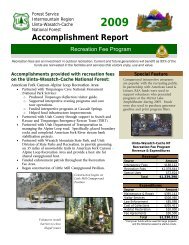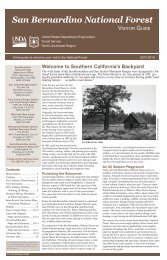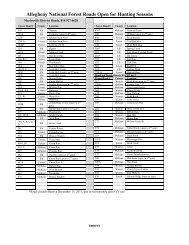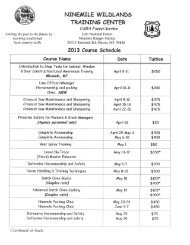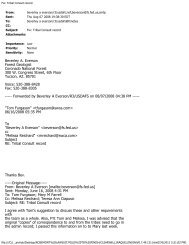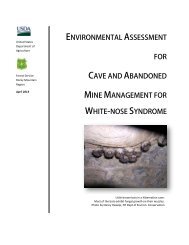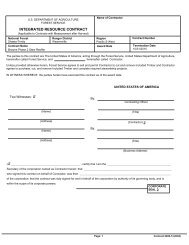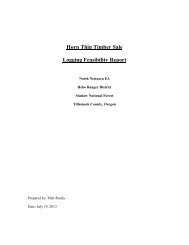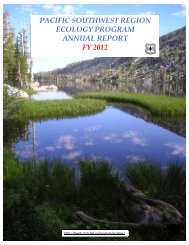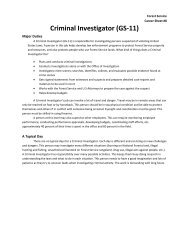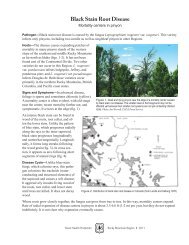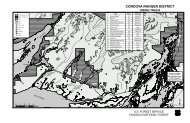Resource Name (Heading 1) - USDA Forest Service - US ...
Resource Name (Heading 1) - USDA Forest Service - US ...
Resource Name (Heading 1) - USDA Forest Service - US ...
You also want an ePaper? Increase the reach of your titles
YUMPU automatically turns print PDFs into web optimized ePapers that Google loves.
Summary of Public Comments - Managing Recreation Uses in the<br />
Upper Segment of the Chattooga Wild and Scenic River Corridor EA<br />
needs to be all visitors. The current analysis is totally unreasonable because they treat paddlers inequitably<br />
and irrationally. (Ltr# 153, Cmt# 1)<br />
DO IT RIGHT! Stop the continuous delays, stop the "preferred alternative" delays, and most importantly<br />
stop the biased, arbitrary, and capricious Upper Chattooga regulations that ban a single user group from<br />
the Upper Chattooga. No other Wild and Scenic River has this kind of discrimination against one user<br />
group. It continues to astonish that the <strong>Forest</strong> <strong>Service</strong> would pander so blatantly to one user group while so<br />
obviously discriminating against another. Doing the wrong thing for a long time is still doing the wrong<br />
thing. Open the Upper Chattooga to boating and do it without the sham studies and the artificial, biased,<br />
and deeply flawed studies that do not fairly and honestly evaluate the real relative impacts (almost none)<br />
that boaters would have on the Upper Chattooga. (Ltr# 157, Cmt# 1)<br />
I see that none of the alternatives in your assessment give equal treatment and consideration to all user<br />
groups, and additionally, that all the alternatives actually discriminate unfairly and unnecessarily against<br />
paddlers. While paddlers cause the least impact on the environment of any user group, they would have the<br />
most restrictions imposed upon them of any user group. Your assessment fails to justify this treatment in<br />
any way. (Ltr# 161, Cmt# 1)<br />
I urge the <strong>Forest</strong>ry <strong>Service</strong> to open the Upper Chattooga to boating. I personally think this catering to the<br />
fishing groups is setting bad precedent for all users of the forest. I am also very offended by the direct<br />
attacks by fishing groups stating that kayakers would damage the delicate environment. The truth is known<br />
the level of kayakers who would or could kayak the Upper Chattooga also care about the pristine<br />
environment as strongly as the same fishing groups. Please end these selfish attitudes and allow fair<br />
sharing for responsible users of the forest and river. Please settle the matter and not allow this bickering to<br />
continue. The <strong>Forest</strong> <strong>Service</strong> has wasted untold hours and money on a non-issue. (Ltr# 162, Cmt# 1)<br />
I am writing in support of lifting the ban of private boaters on the reaches of the upper Chattooga. I have<br />
been both fly fishing and kayaking/canoeing since the age of 12 and fail to see the logic in preferring one<br />
over the other. Furthermore, I regularly kayak and fly fish the Hiwassee river in reliance, Tennessee and<br />
this waterway allows for boating and fishing and it is a wonderful relationship and place to visit. There are<br />
no issues among fishermen and boaters and most fishermen aren't fishing once the water is high enough to<br />
float a kayak or canoe (or tubes, which are common on the Hiwassee). Lastly, the whitewater users need a<br />
higher flow of water to get down the upper Chattooga. These higher flows would not be of use to any<br />
knowledgeable or experienced fishermen as the fish hold down and become that much more finicky until<br />
the levels drop. I have fished extensively in both state/national forest and in the Great Smoky Mountain<br />
National Park and can demonstrate to anyone this fact. So I really don't understand the positions taken by<br />
TU and NFS. There is no sensible reason to discriminate against one set of users other than politics. There<br />
can be compromise in this situation where both parties benefit and can use the water without conflict.<br />
These are public lands and should be open to all taxpayers who are willing to use them responsibly. (Ltr#<br />
165, Cmt# 1)<br />
I have never experienced a conflict paddling these restricted areas, and the reason is a fact of nature. The<br />
conditions for the pursuit of paddling and fishing are mutually exclusive. Fishing is terrible on the days<br />
when the river level is good for kayaking, and any intelligent paddler (there are a few of those!) stays off<br />
the river when the levels are great for fishing. Removing the restrictions will not create a crowd of paddlers<br />
to these sections, because paddlers understand the difficulty of these rapids, and the rarity of adequate<br />
river levels. The current restrictions are probably illegal, and will be eventually judged to be so, as a result<br />
of the current legal actions. The U.S.F.S. should anticipate this, knowing that they are employed to serve<br />
the public, the tax-paying citizen. (Ltr# 167, Cmt# 1)<br />
Why are you so vehemently against allowing equitable use with normal policy procedures that work for<br />
every other National <strong>Forest</strong>? After 12 years and millions of wasted dollars, all of which would have been<br />
better served doing far better things, you still cannot PROVE anything with factual scientific data. (Ltr#<br />
170, Cmt# 2)<br />
Lifting the ban would be inequitable. Introducing whitewater kayaking would grant a marginal benefit to a<br />
small subset of a single-user group while unfairly and irreparably harming the “esthetic,<br />
scenic….features” of the river for a multitude of other diverse and less intense user groups. These other<br />
172



